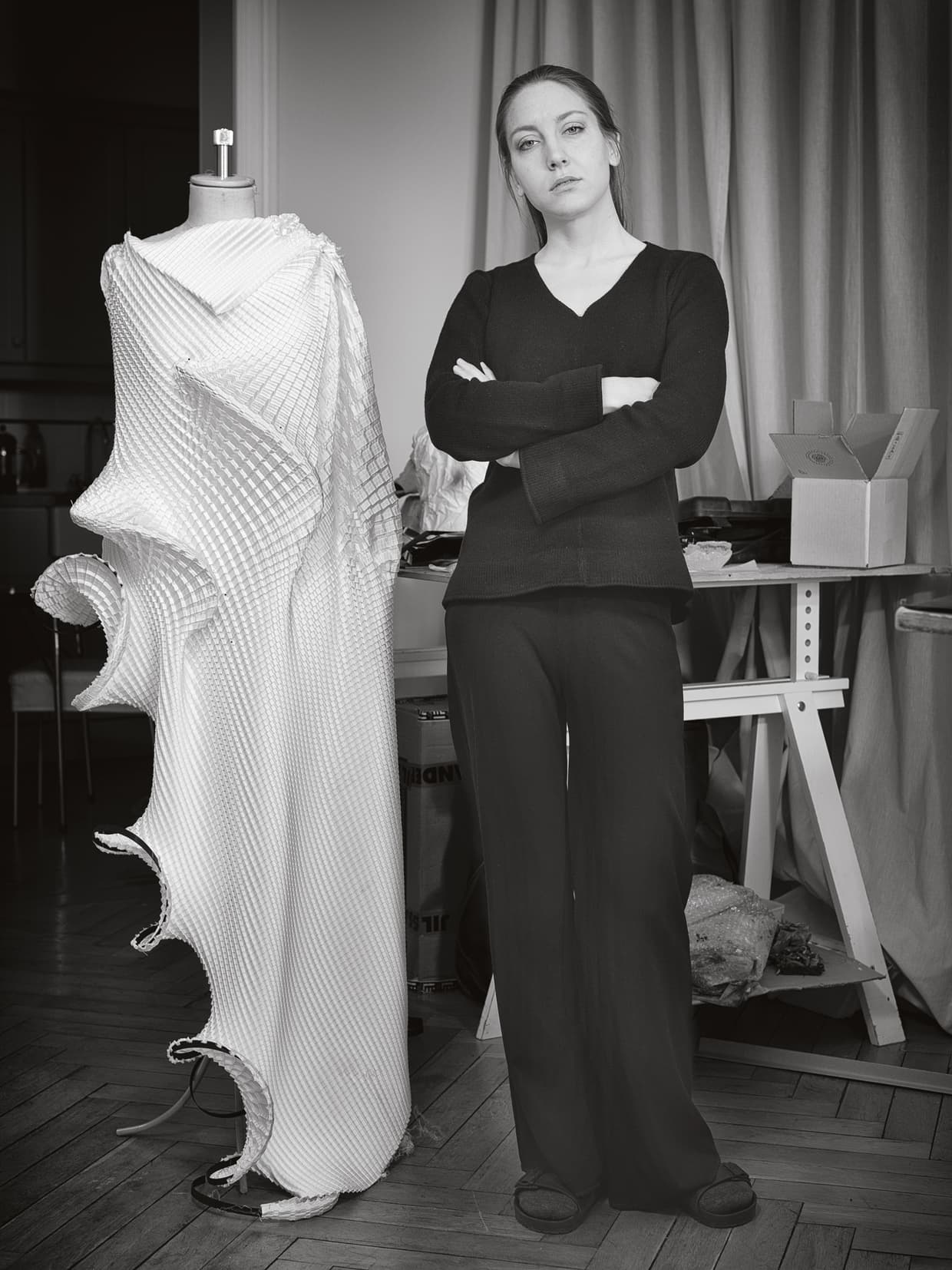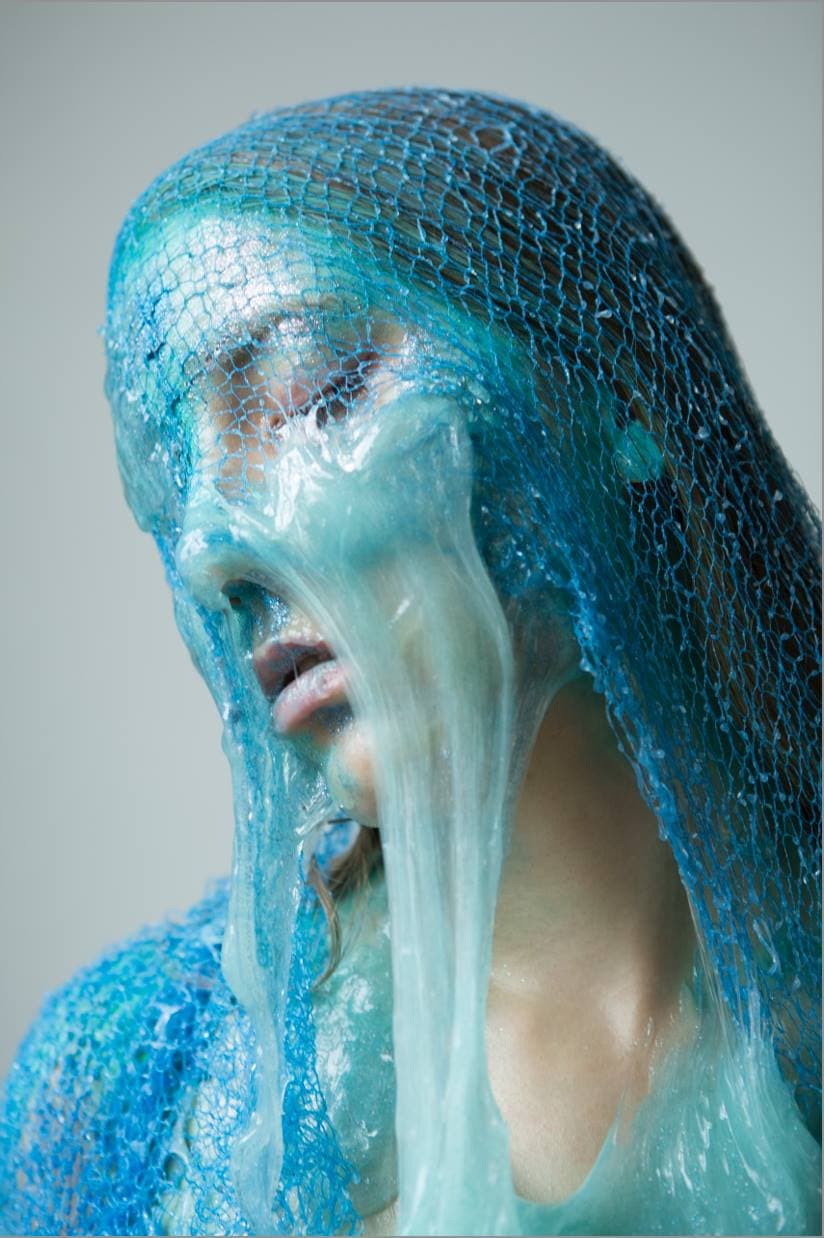Flora Miranda
Meet Flora Miranda, a forward-thinking fashion designer based in Vienna and Antwerp. Flora creates her collections through innovative uses of technology like 3D scanning, 3D printing, laser cutting, machine learning, and generative design. She has shown her seasonal works during Paris Haute Couture Week since January 2018.
Learn how Flora combines creative vision with new technologies and an unstoppable drive to advance the art of couture.
Get to know Flora
Your career at a glance
Originally from Salzburg/Austria, I came to Antwerp/Belgium when I was 18 to study fashion design at the Royal Academy of Fine Arts. After graduating, I freelanced for Iris Van Herpen.
Quickly, I realized that I must apply my drive for strategic, conceptual thinking and design and founded my own company.
In 2017 I built the MVP for ‘IT Pieces’, a format that helps companies communicate and visualize their data. Throughout the years I have won different awards with my work, for example the Good Design Award for the watch I designed for the Swiss company Rado.
My work is known for being full of storytelling, attention to detail and the use of technology such as creative coding to create the designs.
Describe yourself in 3 words
On a scale of 1 to 5, where are you today in life?
On a scale of 1 to 5, where are you today in your career?
On a scale of 1 to 5, how happy are you today with your life?
Your favourite book?
There are so many good ones. But the fairytale “Mio, My Son” by Astrid Lindgren has a special place in my heart. It depicts how imagination can sustain us even in our darkest hours. Two boys face starvation after being locked away, but they survive thanks to the power of their imagination. The story is extremely touching and a really sad story. And in general, it is a portrait of our imagination. How in our imagination we find safety and we can save our lives and the world with it.
Your favourite quote?
“Don’t be scared of the future — shape it.” by Alec Empire.
What childhood passion have you lost in adulthood?
The carefree abandonment of play. As a kid, I spent hours running wild and living fully in the experience. As a creative/innovative person, I am still playful and free – after all, this is one of my core skills to give to others. But it happens in more regulated spaces today and there are only a few people with whom I can still be “stupidly” playful.
Which passion or pastime will you never let go of?
Creativity in all its forms. As an innovator, sparking new ideas and bringing visions to life through making and collaboration is what drives me. Whether drawing, building, crafting music or pursuing technical research, exercising my imagination feeds my soul.
Your dream of a completely different second career?
That would be anything around computer science, painting, or plastic surgery. Each offers a new domain for applying creative skills such as technology, visual artistry or medical innovation.
Cut loose from all strings, what would you like to do with your life?
I’d continue building my vision, tile by tile, bringing ideas to life through creativity and innovation. Money or influence may impact scale, but my focus remains the same — conceptualising solutions and guiding them from conception to reality.
Flora’s career
Your work motivations?
I'm driven by an innate calling to activate my full potential and serve a specific purpose. I see a clear place for my unique contribution and am motivated to dedicate my efforts to roles aligning with this vision.
Your family’s contribution to your career?
My family provides crucial support through unconditional emotional care, creative inspiration from shared talents, grounded yet believing feedback, art knowledge and guidance, complementary skills between my sister and me, and expanded opportunities through my partner's connections.
The biggest obstacles to career growth in our industry?
A few major hurdles include lengthy sales cycles, difficulty finding a precise product-market fit with a single offering, and constrained budgets inhibiting strong, stable creative teams. Extended sales processes tie up resources. Limited budgets jeopardise attracting and retaining top talent to deliver innovative, high-quality work.
Your biggest obstacles facing the technology industry?
Initially, the foreign nature of the topic was a major barrier, as it was so unfamiliar to my network that no one could facilitate an introduction. However, by crafting futuristic narrative works, I gained recognition in art-tech circles and connected with others in the field. Piece by piece, through their guidance, curiosity-driven research and hands-on learning, I acquired tech skills that enabled me to manage and build products.
What have you gotten noticed for throughout your career?
Throughout my career, I've stood out for my experimental and nonconformist approach coupled with extensive cross-disciplinary knowledge. My work demonstrates a nuanced understanding of both the artistic and technical dimensions of creative coding.
The major accelerators for success in our field?
Finding product-market fit is paramount, as transforming a novel concept into a viable business case is central to building anything of lasting worth in technology. This mindset shift around optimisation for market relevance, rather than a singular focus on originality of work, was a significant adjustment coming from my background in the fashion and art industries.
What question do you get asked most often in your line of work?
The question I'm most frequently asked relates to the origins of my passion for technology. People seem quite curious about what sparked my initial interest in this field and prompted me to pursue this line of work.
What do you enjoy most about your job?
Overall, I truly love everything about my work — except for certain logistical and managerial responsibilities that sometimes cause undue stress and instability.
Your role models and mentors?
I view everyone around me as role models, especially those in leadership roles. By observing how others behave and conduct themselves, I determine the type of professional I aspire to become.
As for mentors, that term describes the broad network of colleagues, freelancers, employees and collaborators from whom I continually learn. Every person offers valuable insights. Rather than a single individual, my mentoring occurs across a wide community.
Your golden piece of advice to young women starting out in technology
Approach industry standards thoughtfully. Question whether unwritten rules are truly prudent or ethical. Seek balance between working within existing systems for smooth progression while thoughtfully innovating to ditch outdated practices draining your resources.
What is your leadership style?
My leadership style centers on empowering each individual. I see the true power that lies within every person and aim to cultivate that. “Power” is the keyword here for me.
Which supporting skills have helped you most as a leader?
Having a clear strategic vision for the team and the company's direction has been pivotal, as it allows everyone to stay aligned on goals and priorities. The ability to quickly understand individuals' strengths and weaknesses has helped me empower people in ways that play to their talents.
How have you gained commitment from your team?
I've gained commitment from my team by establishing clear, shared goals oriented around specific events and outcomes, like a product release, launch, exhibition or fashion show.
Working together towards well-defined objectives helps everyone understand how their individual contributions are meaningfully tied to achieving a larger result. Without a clear goal to rally around, it's difficult for people to fully invest their efforts.
How do you make decisions?
I make decisions based on my past experiences.
Can you detail an error you made while managing a customer?
In the past, when handling customer service problems, I solved issues by being honest and admitting mistakes. I have since learned the importance of fully validating the customer's perspective and expressing empathy for any difficulties caused, in addition to correcting issues. The customer is most important.
How do you keep in mind the customer experience in your daily work?
I keep the customer in mind daily by putting myself in their shoes and role-playing scenarios with my team to gain different perspectives.
How has being a woman affected your career?
Neutral
Would you recommend a career in technology to young girls?
Absolutely!
What are you learning now that will be useful in the future?
I'm learning coding and data skills to apply later. Through hands-on experience with real assignments, I'm gaining deeper knowledge in these fields. I'm also sharpening my abilities in areas like service, business cases, and understanding people.
“I learn so much from colleagues, freelancers, employees, and collaborators. Every person has something to show.”
Let’s get technical
Explain the technology that drives your current business.
The core technologies powering my abilities include data visualisation, generative design, machine learning, 3D visualisation, VR.
What is technology for you?
For me, technology represents both an enabler of exploration and evolution, as well as a reflection of human society. It allows for increased complexity and new ideas to be realised. However, technology also introduces its own challenges that then require solutions.
What are your views on future technology trends?
I believe anything is possible, and I am optimistic about the innovations that are yet to come. But I am personally most interested in AI and curious to see what else we can do with it.
In your opinion, what is the greatest technological invention and why?
It's difficult to single out any one invention, as technologies interrelate over time.
What's most impressive, however, is the continual, co-dependent evolution of our technological networks, where all contributions collectively advance scientific discovery and human progress.
Rate these technologies from highest to least impact on business.
- AI
- Social Media
- Security
- Edge cloud
- IoT
- Smartphones
- Smart concepts (cities, buildings, …)
- Human-like robots
- 6G
- 5G
- 3D printing
- Blockchain
Can technology do good for society, or would it be better off without it? Explain.
We are in the middle of technology, so "be better off without it" is out of question. We must do our best to do good with it!!!
How do you keep your technology skills up to date?
Learning is ongoing, so I engage with information and ideas through multiple avenues. Face-to-face interactions, articles, online courses, books, events, hands-on experimentation and collaboration, all help me continually sharpen my skills and stay knowledgeable in a world of constant change.
Which online tools facilitate your day-to-day job?
Several digital tools are integral to my daily work: Github, programming resources tutorials for all kinds of things, time management, cloud solutions, online meetings, social media, …
Your favourite websites?
Though old, http://void.hi-res.net/ remains a favourite — one of my earliest discoveries signalling code's potential for digital poetry.
Your favourite and least favourite technology products?
Ubiquitous internet access, email and search engines are my favourite ones. My least favourite is blockchain/crypto.
The woman behind the technology
What makes each human unique?
Uniqueness arises from a blend of influences — diverse backgrounds, experiences and relationships — along with inherent potential and present choices that sculpt one's perspective.
How we impact others through ongoing achievements, also inspires each life with singular qualities across past, present and future.
Does success compensate for value or morality?
Success metrics like wealth and fame do not replace higher principles. Ideal success stems from achieving through ethical means, though defining such is innately subjective. Ultimate fulfillment lies in adhering to one's own guiding principles rather than surface metrics alone.
What is the relationship between the mind and the body?
The mind is endless, the body is constricted by time and space.
This or that?
Read the instruction manual
Just figure it out
Early adopter
Proven enthusiast
Laptop
Desktop
Apple
Windows
Fail at something
Never attempt it
Listen to the mind
Listen to the body
IOS
Android
E-book
Physical book
Flying cars
Personal robots
Bing
Phone call
Brainstorming session
Solo research
Packed lunch
Cafeteria
Work late
Start early
High Heels
Flats

